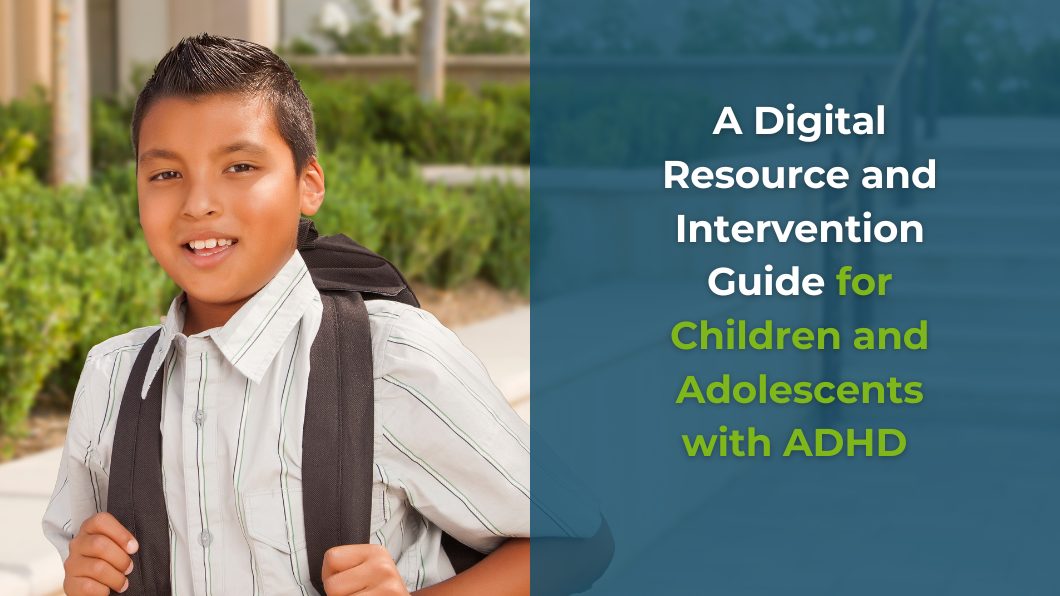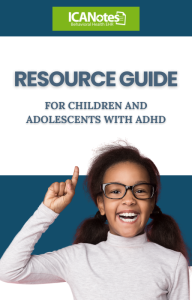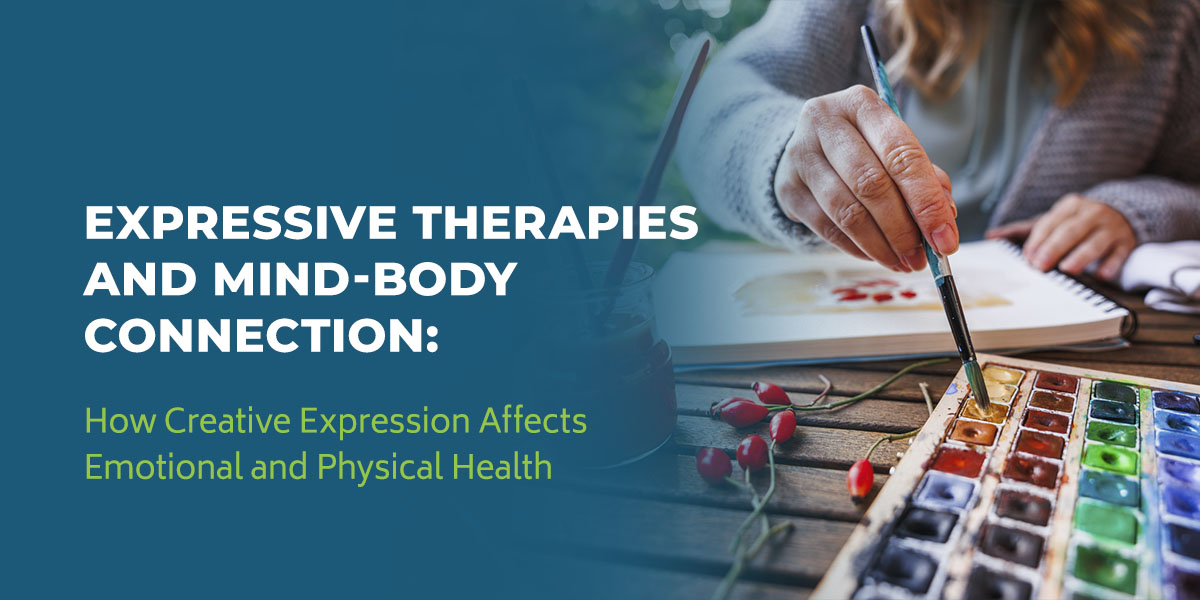
A Digital Resource and Intervention Guide for Children and Adolescents with ADHD
Overview of ADHD in children and adolescents
Attention-deficit/hyperactivity disorder (ADHD) is a neurodevelopmental disorder affecting 11 percent of school-age children. Children with ADHD often experience delays in independent functioning and may behave younger than their peers. Many children affected by ADHD may also have developmental delays in language, motor skills or social development that are not part of ADHD but often co-occur. They tend to have low frustration tolerance, difficulty controlling their emotions and often experience mood swings (CHADD, 2023).
Early intervention for children with ADHD is essential, especially since they have an increased likelihood of experiencing certain difficulties in adolescence and adulthood such as substance abuse and other risky behaviors, academic delays, and social delays. Adolescent girls are also more likely to experience eating disorders while males are at an increased risk of oppositional defiance disorder (CHADD, 2023).
Importance of a multidimensional approach
Studies indicate that a multi-dimensional treatment approach is essential for children with ADHD due to the complexity of the diagnosis. Integrating various therapeutic modalities, such as behavioral interventions, psychoeducation, and medication allows for a tailored and person-centered approach. Behavioral strategies can help in managing specific symptoms, while psychoeducation empowers both the child and their caregivers with a better understanding of ADHD and effective coping mechanisms. Additionally, medication may also assist in regulating neurotransmitter imbalances.
Download the ADHD Interventions Guide
A compilation of digital resources designed to support and assist behavioral health clinicians in managing and treating ADHD in children and adolescents.

Digital Interventions for ADHD to Assist Clinicians in Treatment of Children and Adolescents
This guide will identify and expand on multiple digital intervention strategies and resources to assist clinicians in their treatment of children with ADHD. This guide can be used to implement evidence based digital treatment strategies and resources into treatment planning and individual and family therapy sessions. Additionally, there are a multitude of digital resources to assist families, caregivers, and school staff to support patients with ADHD.
What does the research show about effective ADHD interventions?
ADHD treatment is the most effective when focused on the five following areas:
- Medical Care and Interventions
- Behavioral Therapy Interventions
- Lifestyle Adjustments and Supports
- Parent Training
- Academic Intervention
This guide will focus on each of these ADHD treatment areas and will provide digital resources to assist in intervention.
(Child Mind Institute, 2023).
Medical Care Interventions for ADHD
Many studies show that a combination of medication and behavioral therapy has proven successful in the treatment and management of ADHD symptoms.
Types of ADHD Medications
While many clinicians aren’t prescribers of medication, it can be helpful to suggest and connect appropriate patients with medical providers to discuss the possibility of medical interventions for ADHD. Additionally, it is important for mental health providers to have a basic understanding of ADHD medications and their side effects as these may have impacts on symptoms and presentations. This guide from the Child Mind Institute can be a helpful resource for both families and providers in monitoring medical ADHD interventions.
Addressing and understanding barriers to medication compliance with helpful digital resources
Medication adherence poses notable challenges for children and families dealing with ADHD.
- Stigma surrounding psychiatric medications may lead to reluctance or resistance in accepting pharmacological interventions.
- Concerns about potential side effects and the need for ongoing medication management contribute to inconsistent adherence.
- The nature of ADHD symptoms, characterized by impulsivity and forgetfulness, can impact a child's ability to remember or express the need for medication. Additionally, many parents of ADHD children also have an ADHD diagnosis and can struggle to support their children due to their own focus issues.
- Medication Reminder Apps. Encourage patients and their families to download a medication reminder app if they struggle to remember to take them as prescribed. Request they look in session and find one that looks particularly helpful. Medication Reminder Apps for Apple and Android - GoodRx
- Parental factors, such as skepticism about the necessity of medication or fear of long-term effects, may further hinder consistent adherence.
- Financial constraints and limited access to healthcare resources can also impede the ability of families to obtain and maintain prescribed medications.
Instant Webinar
Comprehensive Strategies for Managing ADHD in Children and Teens
Are you a behavioral health professional looking to enhance your understanding and treatment of Attention-Deficit/Hyperactivity Disorder (ADHD) in children and adolescents? Watch this insightful webinar featuring Bea Sanders, LCSW, as she presents a holistic guide to ADHD interventions.
What You'll Learn:
This webinar explores various ADHD interventions for children and adolescents, backed by statistics and data from reputable sources. These ADHD interventions encompass 5 main categories: medication, behavioral therapy, lifestyle adjustments, parent training, and educational support. When combined, these interventions offer a holistic approach to ADHD treatment which enables children to thrive despite the challenges they face.
Behavioral Therapy Interventions for ADHD
What does the research show?
Parents and caregivers learning to teach children how to better control behavior is the first line treatment for preschoolers with ADHD and helpful for school age children and adolescents as well. This consists of several appointments with a therapist during which parents learn about positive communication skills, appropriate discipline, reinforcement of good behaviors, and structured environments. Between the appointments, parents practice these skills at home.
Digital Individual Therapy Resources
- How to ADHD: Channel Trailer. Jessicca McCabe has an incredible YouTube channel that provides great information about ADHD. Her videos are more focused for young people, but can be applied to adults, children, and teens.
- How to use it in sessions; Often ADHD can fall to the wayside when managing other mental health issues like depression, anxiety, or trauma. Suggest beginning each session with one short video, discussing the contents, and possibly implementing some of the subject matter in between sessions prior to moving on to other issues. Allow clients to choose which video sounds the most appealing or pick a few to suggest based on their treatment goals.
- Her 10 Favorite Online ADHD Resources
Brain Breaks; What are they?
Children with ADHD often struggle to maintain focus due to the nature of the disorder. Studies show that ADHD brains perform better with frequent, short and stimulating breaks. Clinicians, parents/families, and school staff can implement brain breaks in intervals among tasks to assist with focus and attention.
Executive Skills Training
Individuals with ADHD may also have difficulties with maintaining attention, executive function and working memory. Recently, deficits in executive function have emerged as key factors affecting academic and career success. Executive function is the brain’s ability to prioritize and manage thoughts and actions (CHADD, 2023).
- Virtual platforms for interactive skill-building
-
- The Sims FreePlay game is an open-ended simulation of young adult living. It can help kids with ADHD practice everyday skills they’ll need in “real life.” In the app, kids create a “Sim,” or a virtual character, with a personality and preferences. The Sim has needs like eating, sleeping, personal hygiene, social interaction, and having fun. Kids must direct their Sim to take actions to meet the Sim’s needs, as they build and furnish a home, look for jobs, and form relationships.
- The Eye to Eye Empower app was created by Understood founding partner Eye to Eye, with the support of Microsoft EDU. In the app, kids can work through different activities, called quests. Each quest helps kids better understand their strengths and challenges, and develop strategies for success. One unique feature is that when kids finish the quests, they receive an advocacy plan. The plan can help teens with ADHD self-advocate in school and in life.
- TELEMENTAL HEALTH AND CHILDREN: 20 FREE MINIMAL SUPPLY ACTIVITIES
Consider encouraging both patients and their parents to utilize Artificial intelligence (AI) to assist with Executive Dysfunction. The ADHD Center covers different ways to use AI as an assistant for ADHD management in this article: “How AI is changing the game for ADHD Management.”
Here is a list of possible prompts for AI to assist with executive dysfunction;
- (Obstacle Identification); How can I help myself remember to bring my school ID with me when it’s hard for me to think in the mornings?
- (Prioritization); In what order should I do the following chores?
- (Task Initiation); How can I get started cleaning my room when it feels like too much to do and I have no energy?
- (Organization); What are some things I can do at night to help make my mornings easier?
Lifestyle Interventions for ADHD
Sleep Hygiene
- Utilizing digital resources for sleep hygiene
- Sound Sleep Solutions for Kids with ADHD; ATTitude Mag free download (email required)
Physical Activity
- Integrating fitness apps for tailored routines
- The Exercise Prescription for ADHD - CHADD; developing a successful prescriptive exercise program
Diet
Other Lifestyle Focused Digital Resources
Academic Interventions for ADHD
Clinicians have a subset of knowledge that is beneficial in assisting clients and their school families in accommodations to assist with ADHD impairments. Often accommodations (such as extended time) aren’t actually helpful to the students or don’t meet their specific ADHD needs.
Digital Resources for ADHD in the School Setting
- Child Mind Institute; School Success Kit for Kids with ADHD
- The Big List of ADHD School Resources from ADDitude
- Recommending digital apps for organization
- Lots of people use Google Calendar, but they might not realize how helpful it can be for kids with ADHD, too. Your child can use it to keep track of appointments, events, and tasks. One big benefit is that Google Calendar integrates with other Google applications that kids may already use in school. This includes Gmail, Google Keep, and Google Drive.
- Q: “What Time Management Apps Will My Teen with ADHD Actually Use?” (ATTitude Mag).
Parent Training
Psychoeducation for parents
- Child Mind Institute; Parenting Guides. Guides for parents related to a variety of topics such as; ADHD, Autism, Behavioral Issues, ODD, Bedwetting, Depression, Anxiety, Developmental Milestones, etc.
- Understood.org; (Video), Through Your Child's Eyes.
Digital Resources to reinforce behavioral parenting strategies
Digital Resources for Clinicians
- ADDitude Magazines “For Clinicians” Resources
- ADDitude Magazine; The Clinicians’ Guide to Treating Complex ADHD; A seven part series for therapists.
- ADDitude Free Webinars; Webinars for parents, adults, schools, and clinicians
- National Institute For Children’s Health Quality; Caring for Children with ADHD: A Resource Toolkit for Clinicians
As we navigate the ever-evolving realm of healthcare, this guide serves as a timely reminder of the significance of embracing technology to enhance ADHD interventions for children and teens. By advocating for the integration of digital tools, mental health providers not only acknowledge the contemporary needs of this population, but also the potential for technology to revolutionize and improve the overall well-being of those grappling with ADHD. We hope that this review reinforces the importance of harnessing the power of digital resources as a forward-thinking and accessible approach and provides more opportunities to utilize technology in ADHD intervention strategies.
About the Author

Bea Sanders LCSW
Bea Sanders received her Bachelor's and Master's degrees in Social Work from the University of Arkansas, solidifying her commitment to helping individuals and communities flourish. With over a decade of experience, Bea earned her clinical license in 2020 and currently serves as a School-Based Therapist for a Community Mental Health agency. She provides individual, family, and group therapy to adolescents while specializing in innovative therapeutic approaches such as EMDR, ACT, and the Strengths-Based perspective.










